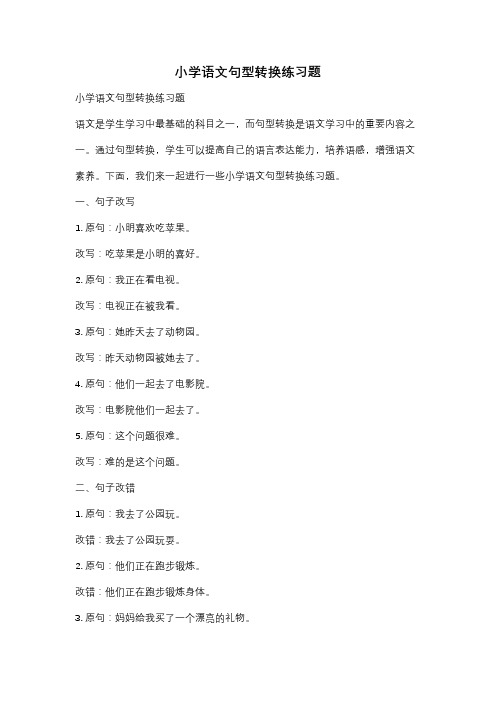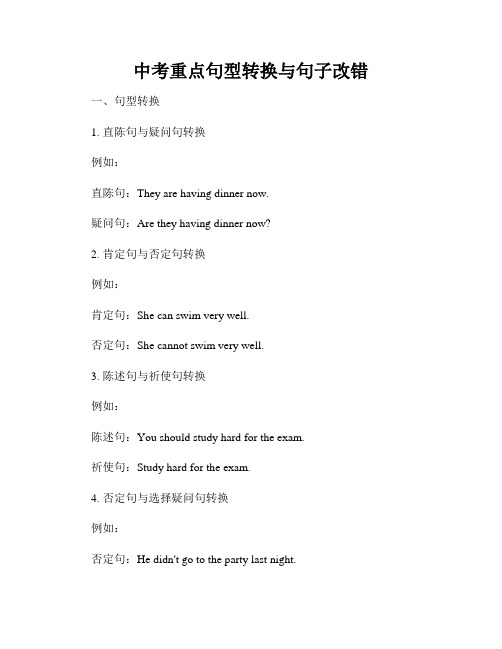句型转换与改错
小学英语修改句子句型转换方法

修改句子方法一·肯定句改否定句的方法:1、在be动词后加not。
如:is not , are not , am not, was not, were not;2、在情态动词can, should, will等后加not。
如:cannot, should not, will not;3、上述都没有的, 在动词前加助动词否定形式don’t/doesn’t/didn’t, 三单用doesn’t, 过去用didn’t, 动词一定要还原。
4、 some 改成any。
二、肯定句改一般疑问句的方法:1、把be动词放在句首, 剩下的照抄, (some 改成any, 第一人称和第二人称互换)句点改成问号。
2、把情态动词can, shall, will等放到句首, 剩下的照抄, (some 改成any, 第一人称和第二人称互换)句点改成问号。
3、上述都没有的, 在句首请助动词Do/Does/Did帮忙, 三单用does, 过去用did, 动词一定要还原, 剩下的照抄, (some 改成any, 第一人称和第二人称互换)句点改成问号。
4、就一般疑问句回答一般疑问句有两种回答, 即:肯定回答和否定回答。
其中, 肯定回答用yes,否定回答用no。
语句顺序为:Yes + 主语+ am /is/ are/was/were.|can.|do/does/did|; No + 主语+ am not/ isn’t/ aren’t/wasn't/weren't.|can't.|don't/doesn't/didn't三、对划线部分提问一代:用正确的疑问词代替划线部分。
二移:把疑问词移至句首三变:把没划线的部分变成一般疑问句的语序(some 改成any, 第一人称和第二人称互换),☆总结关键就是:“特殊疑问词+一般疑问句”(即:先根据划线部分找到特殊疑问词;再把没划线的部分变成一般疑问句的语序。
小学语文句型转换练习题

小学语文句型转换练习题小学语文句型转换练习题语文是学生学习中最基础的科目之一,而句型转换是语文学习中的重要内容之一。
通过句型转换,学生可以提高自己的语言表达能力,培养语感,增强语文素养。
下面,我们来一起进行一些小学语文句型转换练习题。
一、句子改写1. 原句:小明喜欢吃苹果。
改写:吃苹果是小明的喜好。
2. 原句:我正在看电视。
改写:电视正在被我看。
3. 原句:她昨天去了动物园。
改写:昨天动物园被她去了。
4. 原句:他们一起去了电影院。
改写:电影院他们一起去了。
5. 原句:这个问题很难。
改写:难的是这个问题。
二、句子改错1. 原句:我去了公园玩。
改错:我去了公园玩耍。
2. 原句:他们正在跑步锻炼。
改错:他们正在跑步锻炼身体。
3. 原句:妈妈给我买了一个漂亮的礼物。
改错:妈妈给我买了一个漂亮的生日礼物。
4. 原句:我们在图书馆看书学习。
改错:我们在图书馆看书做功课。
5. 原句:他们一起去了游泳池游泳。
改错:他们一起去了游泳池游泳娱乐。
三、句子合并1. 原句:我喜欢唱歌。
我也喜欢跳舞。
合并:我既喜欢唱歌又喜欢跳舞。
2. 原句:他们在公园里玩。
他们在湖边划船。
合并:他们在公园里玩,还在湖边划船。
3. 原句:我正在吃饭。
我同时也在看电视。
合并:我一边吃饭一边看电视。
4. 原句:她在家里写作业。
她在外面玩耍。
合并:她既在家里写作业又在外面玩耍。
5. 原句:他喜欢读书。
他也喜欢画画。
合并:他不仅喜欢读书还喜欢画画。
通过以上的练习题,我们可以看到,句型转换可以帮助我们更好地理解句子的结构和语言的表达方式。
通过改写句子,我们可以运用不同的句型和表达方式来表达同一个意思,丰富自己的语言表达能力。
而通过改错练习,我们可以更加敏锐地察觉语言中的错误,提高自己的语言准确性。
句子合并则是锻炼我们的逻辑思维和语言组织能力,使我们能够更好地将多个句子合并为一个完整的句子。
句型转换不仅仅是一种语文练习,更是培养学生语感、提高语文素养的重要手段。
句型转换小学常见句型变换技巧解析

句型转换小学常见句型变换技巧解析句子是语言表达的基本单位,句型的变化对于提高句子的表达能力至关重要。
在小学阶段,学生需要掌握一些常见句型的转换技巧,以丰富表达方式,增强语言的灵活运用能力。
本文将介绍一些常见的句型转换技巧,帮助小学生提高语言表达能力。
1. 直陈句转疑问句在英语中,直陈句可以通过改变句子结构来转换成疑问句。
要转换为一般疑问句,只需把句首的助动词或be动词提到句首即可。
例如:直陈句:He is a student.一般疑问句:Is he a student?对于没有助动词或be动词的句子,我们可以使用do/does/did来转换。
例如:直陈句:She likes ice cream.一般疑问句:Does she like ice cream?2. 直陈句转否定句直陈句可以通过在助动词或be动词后面加not来转换成否定句。
例如:直陈句:I am a student.否定句:I am not a student.对于没有助动词或be动词的句子,我们可以使用do/does/did来转换。
例如:直陈句:They play soccer.否定句:They do not play soccer.3. 陈述句转祈使句陈述句可以通过去掉主语和be动词来转换成祈使句。
例如:陈述句:You are a good student.祈使句:Be a good student.4. 直陈句转感叹句直陈句可以通过在句首加上“What”、“How”等疑问词或感叹词来转换成感叹句。
例如:直陈句:The book is interesting.感叹句:How interesting the book is!5. 陈述句转条件句陈述句可以通过在句首加上if来转换成条件句。
例如:陈述句:I will go to the park tomorrow.条件句:If I go to the park tomorrow.6. 直陈句转间接引语直陈句可以通过改变人称和时态,引入引号和连词来转换成间接引语。
句型转换ppt课件

在句型转换时,应根据语境和表达需求选择适当的转换方式,如主动句变被动句、肯定句变否定句等 。通过灵活运用不同的转换方式,可以使句子更加丰富多样,增强语言的表现力。
注意句子语序的调整
总结词
在句型转换过程中,语序的调整是一个重要 的技巧。
详细描述
由于中文的语法结构与英语不同,在进行句 型转换时,需要注意语序的调整。通过合理 安排词语的顺序,可以更好地表达句子的意 思,并使句子更加符合中文的表达习惯。在 进行语序调整时,可以参考中文的语法规则 和习惯用法,以确保转换后的句子语序正确 、流畅自然。
示例
将“The cat sat on the mat.” 的主语转换为“A cat sat on a mat.”
谓语转换
谓语转换
改变原句的谓语动词,以表达不同的 语气或强调不同的重点。
示例
将“The dog chased the ball.”的谓 语转换为“The ball was chased by the dog.”
主语错误
主语缺失
主语与谓语搭配不当
在句子中没有明确的主语,导致句子 结构不完整。
主语和谓语之间缺乏逻辑关系或语义 联系。
主语错位
主语的位置不正确,导致句子意思表 达不清。
谓语错误
谓语缺失
句子中缺少谓语,导致句子结构不完整。
谓语错位
谓语的位置不正确,导致句子意思表达不清。
谓语与宾语搭配不当
谓语和宾语之间缺乏逻辑关系或语义联系。
句型转换ppt课件
目 录
• 句型转换简介 • 简单句型转换 • 复合句型转换 • 句型转换技巧 • 句型转换练习 • 句型转换常见错误与纠正
01
句型转换简介
中考重点句型转换与句子改错

中考重点句型转换与句子改错一、句型转换1. 直陈句与疑问句转换例如:直陈句:They are having dinner now.疑问句:Are they having dinner now?2. 肯定句与否定句转换例如:肯定句:She can swim very well.否定句:She cannot swim very well.3. 陈述句与祈使句转换例如:陈述句:You should study hard for the exam.祈使句:Study hard for the exam.4. 否定句与选择疑问句转换例如:否定句:He didn't go to the party last night.选择疑问句:Did he go to the party last night?5. 特殊疑问句转换为陈述句例如:特殊疑问句:What is your favorite color?陈述句:My favorite color is blue.二、句子改错(以下为例句,具体句子改错内容可自行拓展)1. We will go to the park after we finished our homework.改正:We will go to the park after we finish our homework.2. The girl is very kind and always help others.改正:The girl is very kind and always helps others.3. What interesting news did you hear from your friend?改正:What interesting news did you hear from your friends?4. He told me that don't forget to bring my umbrella.改正:He told me not to forget to bring my umbrella.5. Are you going to visit your grandparents or go shopping this weekend?改正:Are you going to visit your grandparents or are you going shopping this weekend?6. The weather is very nice, so we decided to take a walk and went to the park.改正:The weather is very nice, so we decided to take a walk and go to the park.7. Can you let me know where is the nearest bus stop?改正:Can you let me know where the nearest bus stop is?8. My brother said if he has enough time, he will go to the party with us.改正:My brother said if he has enough time, he would go to the party with us.三、总结以上是中考重点句型转换与句子改错的内容。
高中英语句型转换讲解及练习

高中英语句型转换讲解及练习在高中英语研究中,句型转换是一个重要的部分。
通过转换句型,我们能够提升语言表达的灵活性和准确性。
本文将为你讲解一些常见的句型转换方法,并提供练题供你巩固。
1. 同义句型转换1.1 句式转换在同义句型转换中,我们可以通过改变句子的结构来表达相同的意思。
以下是一些常见的句式转换方法:- 肯定句转否定句:将句子中的动词前加“not”或使用否定词。
- 否定句转肯定句:将句子中的动词前去掉“not”或去掉否定词。
- 疑问句转陈述句:将疑问句改为陈述句的语序。
- 陈述句转一般疑问句:将陈述句的语序改为疑问句的语序。
- 一般疑问句转特殊疑问句:将一般疑问句的句式改为特殊疑问句的句式。
1.2 词汇转换除了句式转换,我们还可以通过更换词汇来表达相同的意思。
以下是一些常见的词汇转换方法:- 动词变形:使用动词的不同形式,如时态、语态等。
- 同根词替换:使用与原词有相同词根的词汇替换。
- 同义词替换:使用与原词意思相近的同义词替换。
2. 练题请根据以下句子进行句型转换练:1. Tom doesn't like playing basketball.2. Did you finish your homework last night?3. I can swim across the river.4. She is the most beautiful girl in our class.5. How often do you go to the cinema?答案:1. Tom dislikes playing basketball.2. You finished your homework last night, didn't you?3. It's possible for me to swim across the river.4. She is the girl in our class who is the most beautiful.5. What is the frequency of your visits to the cinema?。
英语句型转换的方法与例子
英语句型转换的方法与例子摘要英语句型转换是指按照一定的要求,把一个句子改写成另一个意思相同或相近的句子,不改变原句的主要意思。
英语句型转换的目的是为了使句子更加简洁、准确、自然和地道,也可以增加句子的变化和丰富性,避免重复和单调。
英语句型转换的方法有很多,本文将介绍以下几种常见的方法:同义词或近义词替换主动语态和被动语态互换陈述句和疑问句互换直接引语和间接引语互换并列句和复合句互换定语从句和非限制性定语从句互换分词短语和独立主格结构互换一、同义词或近义词替换定义同义词或近义词替换是指用意思相同或相近的词或短语来替换原句中的某些词或短语,使句子更加简洁、准确或地道。
规则替换的词或短语必须在意思、用法、搭配和语气上与原词或短语相符。
替换后的句子不能改变原句的主要意思。
替换后的句子不能造成歧义或误解。
例子原句替换后的句子He is very angry with me.He is very mad at me.She passed away last night.She died last night.He made a mistake in the test.He went wrong in the test.I can't stand him.I hate him.He gave me a hand with my homework.He helped me with my homework.二、主动语态和被动语态互换定义主动语态和被动语态互换是指把一个主动语态的句子改写成一个被动语态的句子,或者把一个被动语态的句子改写成一个主动语态的句子,使句子更加客观、强调或适应上下文。
规则主动语态变被动语态时,要把原主语变成by短语放在被动语态谓语之后,把原宾语变成新主语放在被动语态谓语之前,把原谓语动词变成被动形式(即be+过去分词),并保持时态、人称和数一致。
被动语态变主动语态时,要把原by短语去掉,把原主语变成新宾语放在主动谓语之后,把原谓语动词变成主动形式,并保持时态、人称和数一致。
学习正确的句式变换与句型转换
学习正确的句式变换与句型转换在英语写作中,句式的多样性和句型的转换能力是非常重要的。
通过巧妙地运用不同的句式和句型,我们可以使文章更加流畅、生动有趣。
本文将从句式变换和句型转换两个方面介绍如何学习和应用正确的技巧。
一、句式变换1. 主动语态变被动语态主动语态的句子结构为“主语+动词+宾语”,而被动语态需要将主语与动词形式进行转换,变为“宾语(主语)+ be动词+过去分词”。
例如,将句子“The boy ate an apple”变为被动语态可写成“An apple was eaten by the boy”。
2. 句子的倒装正常语序的英文句子一般为“主语+谓语+宾语”,但在特定情况下,为了强调或改变句子结构,我们可以使用倒装。
常见的倒装结构有完全倒装、部分倒装和否定副词倒装。
例如,“I have never seen such a beautiful sunset”可以改写为“Never have I seen such a beautiful sunset”。
3. 同位语从句变为定语从句同位语从句常用来对前面名词进行解释或说明,通常使用的连接词有that、whether、if等。
如果想将同位语从句转换为定语从句,可以使用关系代词或关系副词引导。
例如,将句子“I have no idea whether hewill come or not”改写为定语从句可写成“I have no idea whether he will come or not”。
二、句型转换1. 主从句互换在英语写作中,使用复合句可以使文章更加丰富有层次。
通过主从句的互换,可以使句子结构更加多样化。
例如,“Although it was raining, we still went for a walk”可以改写为“We still went for a walk although it was raining”。
2. 简单句变复合句为了使文章更加生动和有逻辑,我们可以将简单句转换为复合句。
句子改错技巧
句子改错技巧句子改错是英语语法学习中非常重要的一部分,掌握好句子改错的技巧可以帮助我们更准确地理解和使用英语。
本文将介绍几种常见的句子改错技巧,帮助读者提高英语写作和阅读的准确性。
一、主语和谓语动词的一致性在英语中,主语和谓语动词的一致性是句子改错中常见的问题。
正确的主语和谓语动词的搭配可以提高句子的准确性和流畅性。
例如,在下面的句子中,主语与谓语动词的形式不一致:原句:My brother and sister is going to the park.改正后:My brother and sister are going to the park.二、冠词的正确使用冠词在英语句子中起到限定名词的作用,但是其使用也有一定的规则。
常见的错误之一是没有使用冠词或者使用了错误的冠词。
例如,在下面的句子中,冠词的使用有误:原句:She has dog and cat.改正后:She has a dog and a cat.三、动词时态的正确使用动词时态在句子改错中经常出现错误。
正确的动词时态可以帮助我们准确地表达动作的发生时间以及与其他动作的关系。
例如,在下面的句子中,动词时态的使用有误:原句:He go to the library yesterday.改正后:He went to the library yesterday.四、单复数名词的正确使用在英语中,单复数名词的使用也是句子改错中常见的问题。
正确的单复数名词形式可以使句子更准确地表达意思。
例如,在下面的句子中,名词的使用有误:原句:I have many informations about the topic.改正后:I have much information about the topic.五、词汇拼写的正确性词汇拼写是句子改错中最容易发生错误的地方之一。
拼写错误不仅会影响句子的准确性,还会给读者留下不专业的印象。
因此,在写作过程中,务必要注意词汇拼写的正确性。
句子改错技巧总结大全
句子改错技巧总结大全一、引言在英语学习过程中,我们经常需要进行句子改错的练习。
通过对句子中存在的错误进行纠正,可以帮助我们更好地掌握语法规则和语言运用能力。
本文将总结一些常见的句子改错技巧,帮助读者更加准确地找出并改正句子中的错误。
二、主体部分2.1 时态错误修正时态错误是我们经常会遇到的一种错误类型。
以下是一些时态错误的修正方法:- 一般现在时与一般过去时的混淆:如果句中的动作发生在过去,应将动词改为一般过去时态;- 现在进行时与一般现在时的混淆:如果句中的动作是在说话时正在进行,应将动词改为现在进行时态;- 一般过去时与过去完成时的混淆:如果句中需要表示在过去某个时间点之前已经完成的动作,应将动词改为过去完成时态;- 现在完成时与一般过去时的混淆:如果句中需要表示过去已经完成的动作对现在有影响,应将动词改为现在完成时态。
2.2 代词错误修正代词错误也是常见的句子错误之一。
以下是一些代词错误的修正方法:- 主谓一致的代词使用:代词需与它所替代的名词在数、格方面保持一致;- 指代不明确:代词使用时需要确保读者可以清晰地理解它所指代的名词;- 主动代词和被动代词的区分:当句子的主语是执行动作的人时,需使用主动代词;当句子的主语是执行动作的对象时,需使用被动代词。
2.3 词性错误修正词性错误是句子改错中常见的错误类型之一。
以下是一些常见的词性错误的修正方法:- 形容词与副词的混淆:如果要修饰名词,应使用形容词;如果要修饰动词、形容词或副词,应使用副词;- 可数名词与不可数名词的混淆:可数名词和不可数名词在量方面的概念不同,应使用正确的名词形式。
2.4 冠词错误修正冠词错误也是我们在句子改错过程中需要重点关注的一种错误类型。
以下是一些常见的冠词错误的修正方法:- 不定冠词与定冠词的混淆:如果后面的名词是唯一的或特指的,应使用定冠词;如果后面的名词是不特指的或泛指的,应使用不定冠词;- 复数名词与单数名词的混淆:如果后面的名词是可数名词复数形式,应使用不定冠词或定冠词的复数形式。
- 1、下载文档前请自行甄别文档内容的完整性,平台不提供额外的编辑、内容补充、找答案等附加服务。
- 2、"仅部分预览"的文档,不可在线预览部分如存在完整性等问题,可反馈申请退款(可完整预览的文档不适用该条件!)。
- 3、如文档侵犯您的权益,请联系客服反馈,我们会尽快为您处理(人工客服工作时间:9:00-18:30)。
一.改为同义句1.The mountain is very beautiful.(改为感叹).______ ____beautiful mountain it is!2.How is the weather in China?(改为同义句)。
______the weather ______in China.3.The boy is the most careless in his class.(改为同义句)。
The boy is ______ ______than _________boy in his class.4.He didn't watch TV,his mother didn't either.(改为同义句)_________he ______his mother watched TV.5.I spent the whole afternoon learning English.(同上)。
I spent ______ _______ ________learning English.6.I spent 100 yuan on the coat.(同上)I _____100 yuan _____the coat.I ______100 yuan ________the coat.The coat _______me 100 yuan.7.He has worked in this school since 2 years ago.(对划线部分提问)_______ _______has he worked in this school.8. “Did you have a good sleep last night?” David asked Jim.。
David asked Jim _____ he _____ well last night.4. The motorbike cost him 8000 yuan last year. He _____ 8000 yuan _____ the motorbike last year.5. He came to the city two years ago.He ______ _____ in the city for two years.6. In our hometown, spring usually lasts from March to May.In our hometown, spring usually starts in March and __________ __________ to May.7. Most children begin school when they are seven. Most children begin school __________ the __________ of seven.8. Uncle Wang has been our neighbour for years.Uncle Wang has lived ____close____to__ us for years.9. The digital camera is too expensive for me.I aren't________ to have the digital camera because its price is too __________.10. Mount Qomolangma is the tallest mountain in the world.Mount Qomolangma is __________ than __________ other mountain in the world. 11. “Don‟t play football on your way home,”the teacher said.The teacher told us ____ to play football on your way home.12. I don…t think his father knows English. His father hardly knows Enlish.______ he?13. Our city is going to build another Y angtze River bridge this year.Another Yangtze River bridge will be ____ in our city this year.14.David‟s car is more expensive than Bob…s.Bob‟s car is _______ expensive than David…s.15. I‟ll never forge t that place;it is there that we met each for the first time.I…ll never forget that place_____we met each for the first time.16. When I saw the great changes in my hometown,I felt very proud._____ the the great changes in my hometown,I felt very proud.二.句型转换1. This dress cost her 90 yuan. (改为一般疑问句)。
_____ this dress _____ her 90 yuan?2. The TV play is really wonderful. (改为感叹句)。
_____ _____ the TV play is!3. The boy in blue is my brother. (就划线部分提问)。
_____ _____ is your brother?4. Water the young tree often,or it will die. (改为同义句)。
_____ you don‟t water the young tree often,it will be_____.5. Tom won… t visit the farm. He‟11 stay at home. (改为同义句)。
Tom will stay at home _____ _____ visiting the farm.6.My brother bought some CDs yesterday. (改为否定句)。
My brother ________________ any CDs yesterday.7 Mary will come here in ten minutes. (对划线部分提问)。
_________ _________ will Mary come here?8. “Where will you go during the summer holidays?” he asked me. (保持原句意思)He asked me where _________ _________ go during the summer holidays.9. He will be away for long next year. (改为否定句)He ______ be away for long next year.10. This is my box. (改为复数形式)____ are our_____.11. The Y ellow river is 5,464 kilometres long. (对画线部分提问)_____ _____is the Y ellow River?12. Mrs Smith is busy now. She is doing her housework at home.Mrs Smith is _____ _____ her housework at home.II.按要求转换下列句型。
1. My mother works in a hospital .(改为一般疑问句)_______ _________ mother ___________ ina hospital ?2. My brother does homework after supper .(改为否定句)My brother _________ ___________ homework after supper .3. Is Liz a boy‟s name ? Is Liz a girl‟s name ?(改为选择疑问句)________ Liz a boy‟s _________ a girl‟s name ?4. English people have three names .(对画线部分提问)________ __________ names ________ English people _________ ?5. Mr Black is living in China . (对画线部分提问)_____ _____ Mr Black ___________ ?6. We are going to see Uncle Wu next Sunday . (对画线部分提问)______ __________ you going to _________ next Sunday ?7. He is going to the zoo this Saturday. (对画线部分提问)________ ______ he _______ to the zoo ? 8. Mr White gives us a talk .(用next week 改写)Mr White ______ _______ ______ _______ us a talk next talk .1. We are going to have some classes this Sunday . (改为否定句)We _____ going to have _______ classes this Sunday .2. I think the boys are from England . (改为否定句)I _______ ________ the boys _____ from England .3. Lily would like some apples . (对画线部分提问)_____ _________ Lily ________ ?4. I like to stay at home because I don‟t want to have classes .(对画线部分提问)________ _______ you ________ to stay at home ?5. There is something wrong with my computer . (改为否定句)There is _______ _________ with my computer .6. Open the door . (改为否定句)_______ _______ the door .7. He goes to school by bike every day . (对画线部分提问)________ ________ he _________ to school every day .8. He needs some help . (改为否定句)He ________ ________ ________ help .9. Must we go to the classroom now ? (做否定回答)________ , ________ __________ .10. My best friend stands behind LeiLei . (对画线部分提问)_______ ______ your best friend ________ ?11. Y ou need a number 18 bus . (对画线部分提问)________ bus _________ I ________ ? 12. My father sometimes watches TV in the evening . (对画线部分提问)______ ____your_____father _______TV in the evening ?13. The man over there is a doctor . (对画线部分提问)________ ________ the man over there ?________ ________ the man over there ________ ?14. He lives on the second floor . (对画线部分提问)_______ _______ _______ he ________ on ?15. Tom reads for half an hour every day . (对画线部分提问)_______ _______ _______ Tom _______ every day ?16. They finished their work at 6:00 p.m . (对画线部分提问)_________ ________ _______ they ________ their work ?17. Li Hua was at home yesterday . (改为否定句)Li Hua __________ ________ at home yesterday .18. It took me forty minutes to go to work last year . (对画线部分提问)________ __________ ________ it ______ to go to work last year ?19. They had a meeting last week . (改为一般问句)________ they __________ a meeting last week ?20. He read an English book last night . (改为一般问句)____ he ______ an English book last night ?21. The robot could help Mr Mott to remember everything . (对画线部分提问)________ _______ the robot help Mr Mott _________ _________ ?22. They came to borrow some books . (对画线部分提问)_________ _________ they ____________ ?23. I learnt German by myself . (对画线部分提问)_______ _______ you __________ German ?24. She can dance , _________ _________ ? (反意疑问句)25. Let us go to the zoo , ________ ________? (反意疑问句)26. Let‟s go home , _________ __________ ? (反意疑问句)27. He must be tired , _________ _______ ? (反意疑问句)28. There is little milk in the bottle , _________ _________ ? (反意疑问句)29. Close the door ,________ _________ ? (反意疑问句)30. I think she is a teacher , ________ ________ ? (反意疑问句)31. Nobody is here , ________ ___________ ? (反意疑问句)32. Y ou had better study hard , ________ _________ ? (反意疑问句)33. Learning English well is very easy , _______ ________ ? (反意疑问句)34. Something is wrong with my watch , ________ ________ ? (反意疑问句)35. It‟s very hot today . (对画线部分提问)________ _________ __________ like today ?36. Wang Hong is a good girl . (改为感叹句) _______ _______ _______ ______ Wang Hong is !37. Ann was very happy . (改为感叹句)______ _______ Ann was !38. It‟s nearly 2 kilometer from my home to the school . (对画线部分提问)_________ ________ is it ____ your home ____ the school ?39. It will be windy tomorrow . (改为否定句)It _______ ______ windy tomorrow .40. John has a nice bag . (改为一般问句)________ John ________ a nice bag ?41. My father likes to get up early . (对画线部分提问)________ _________ to get up early ?42. Sandy was born in Gaozhou at Jul 1st 1989 . (对画线部分提问)_____ ______ ______ _______ Sandy born ?I.同义句转换:根据上句完成下句,使上、下两句意思相同或相符。
